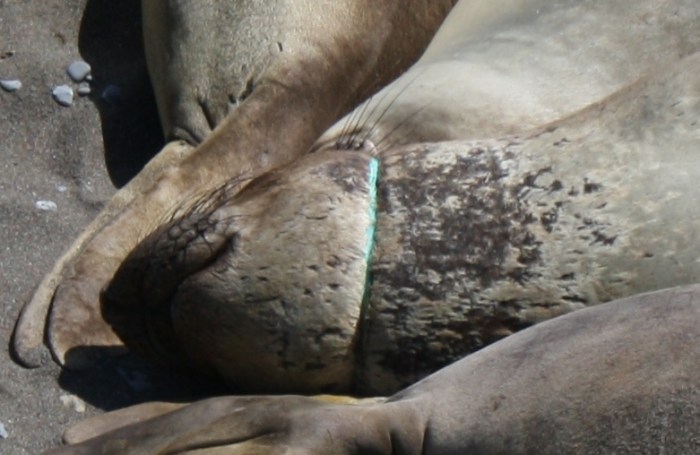
Colossal numbers of plastic bottles and bags float around the earth, and their severe impact on marine life has been extensively documented. But there’s another, lesser-known killer plastic lurking in our oceans. Every year, more than 136,000 whales, dolphins and seals and millions of fish, turtles and birds are caught in “ghost gear“—abandoned, lost and discarded fishing nets, lines and traps that can take up to 600 years to decompose.

A sea lion in California entangled and injured by a gill net; rescuers were able to successfully untangle her. (© Kanna Jones / Marine Photobank)

A dead cormorant entangled in a ghost net in Cornwall, UK. (© Dave Peake / Marine Photobank)
Once left in our oceans, derelict fishing gear keeps doing what it was designed to do: catching animals. Marine creatures entangled in this incredibly durable material suffer a prolonged and painful death, usually suffocating, succumbing to painful infections or starving to death over a period of months.
An estimated 640,000–800,000 tons of ghost gear is left in our oceans annually, with reports finding that over 817 species are trapped and killed under the surface by this litter. Ghost gear eventually breaks down into microplastics, tiny as grains of sand, and can have a lasting effect on marine life for many years. These minute plastic granules are found in water and sediments and may have a toxic effect on our own food chain that scientists are only beginning to understand.
A 2015 study found that more than a quarter of fish sold at markets in California and Indonesia contain plastic from different sources—meaning many seafood consumers are unwittingly ingesting plastic particles, as well as any toxins that those plastics may be carrying.
Illegal, unreported and unregulated fishing, known as IUU fishing, also contributes to the proliferation of ghost gear. Both the United Nations Environment Program and the Food and Agriculture Organization of the United Nations have acknowledged an indisputable link between IUU fishing and ghost gear.
Fishers operating illegally are more likely to abandon their fishing gear to evade capture; some vessels fishing illegally will also dump gear to avoid being denied entry to port. These illegal fishing operations cause immense suffering to marine animals, with some entities making big profits knowing there is a very small chance they’ll be apprehended.

A ghost net entangling 17 dead sea turtles was discovered days after a storm off the coast of Bahia, Brazil. (© Projeto Tamar Brazil / Marine Photobank)
Our national bodies of water may soon face intensified legal threats, too. As The Guardian reports, Interior Secretary Ryan Zinke has recommended to President Trump that “three sprawling marine monuments, one in the Atlantic and two in the Pacific, be either opened up to the commercial fishing industry or reduced in size, or both.” These large marine protected areas play a crucial role in protecting sea animals from ghost gear, which often travels long distances from its point of origin.
Around northwest Hawaii alone, ghost gear is believed to be the biggest man-made threat to the critically endangered monk seal, with a total population of less than 1,200. And robust marine monuments can actually help cultivate more sustainable fisheries in the long term by allowing depleted and overfished species, like the Pacific tuna, to rebound.

Ghost gear collected during a beach clean-up by World Animal Protection and Surfers Against Sewage on Perranporth beach, Cornwall, UK. (© World Animal Protection/Greg Martin)
The Global Ghost Gear Initiative was founded by World Animal Protection in 2015 and has more than 64 participants, including the U.S. National Oceanic and Atmospheric Administration. GGGI is bringing together partners to reduce the volume of ghost gear, remove and recycle such gear from the oceans, and rescue entangled animals. Eliminating ghost gear doesn’t only help marine animals—it also safeguards human health and livelihoods, spurring a circular economy.
For example, Bureo, a Chile-based GGGI participant, makes skateboards, sunglasses and other products from recycled fishing nets. Its recycling program, Net Positiva, provides gear collection points to keep plastic nets out of our oceans, protecting wildlife and supporting local fishing communities at the same time. Another member company, Plastix Global LLC in Denmark, has transported end-of-life fishing nets from remote fishing grounds in Alaska to be recycled and turned into new products.

The author joined partner group Hawaii Wildlife Fund on a beach survey and cleanup in Hawaii. A hurricane had just hit the island, washing ashore even more debris than usual. (© World Animal Protection/Rachel Ceretto)
Fish evolved in the oceans over 500 million years ago while humans have been around for just 200,000 years. It is a tragedy that in just the last few decades, we’ve caused so much destruction to our oceans, which have been teeming with life since the days of the dinosaur.
It’s unacceptable—and unnecessary—for so many animals to suffer prolonged, painful deaths because of ghost gear. In the U.S., we can make a huge difference by maintaining our marine protected areas and continuing to enforce the Marine Mammal Protection Act. And we hope that governments and seafood companies around the world will join the GGGI to confront this preventable threat to the majestic animals who live in our oceans.
–From Alternet.org
Learn more about the campaign to protect ocean wildlife.
Categories: Entangled Marine Mammals, Entangled Sealife, Ghost Nets, Plastics and marine mammals
 Ghost Gear Remains Major Ocean Polluter
Ghost Gear Remains Major Ocean Polluter  Marine Debris–A Growing Planetary Threat
Marine Debris–A Growing Planetary Threat
Leave a comment